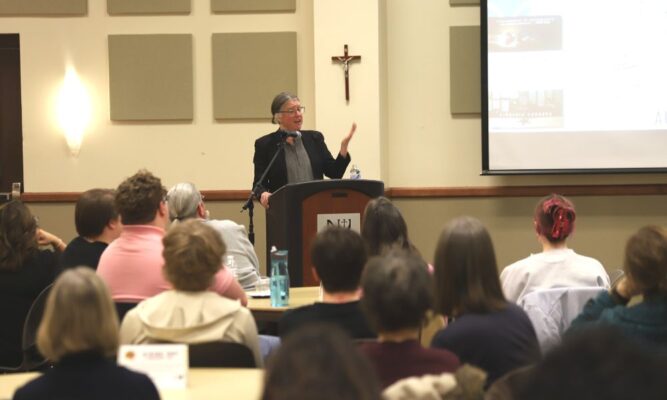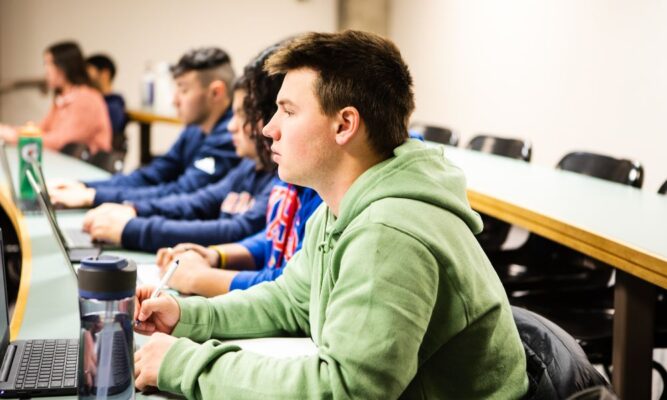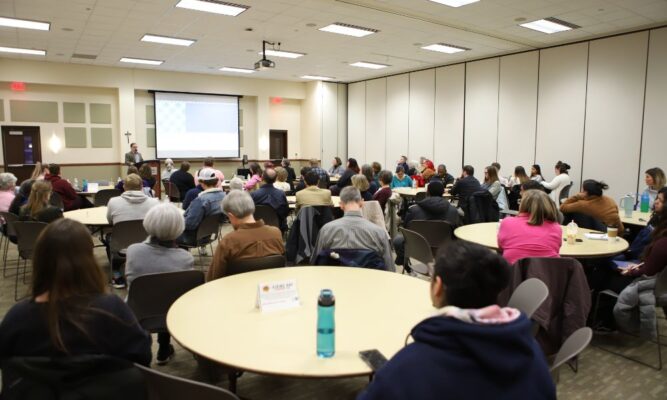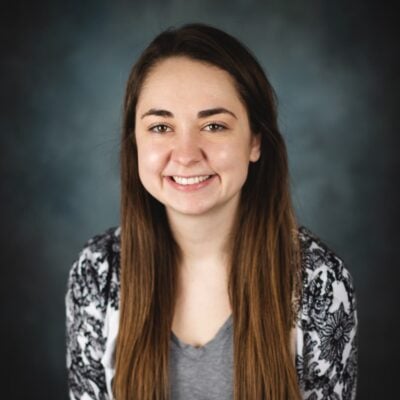Author, political scientist and professor Virginia Eubanks spoke on campus Feb. 1 as part of Newman University’s three-year project “Emphasis in Technology and Human Values (ETHV),” funded by a National Endowment for the Humanities (NEH) grant.
When the ETHV grant committee was introduced to Eubanks’ published book, “Automating Inequality: How High-Tech Tools Profile, Police, and Punish the Poor,” it complimented the new certificate program in progress at Newman, which focuses on technology and human values.
“Virginia Eubanks knows how to tell a story while captivating each audience member,” said Rachel Lang, administrative assistant for the Newman Division of Arts and Humanities. “There are several unjust systems in the world and we as a society must work together to push for human, social and cultural rights.”

More than 90 people filled the Dugan-Gorges Conference Center for Eubanks’ public talk, “Automating Care: Technology, Caregiving, and the Labors of Love,” on Feb. 1.
Along with the public talk, Eubanks spoke during a lunch and learn with faculty and also visited with students of Associate Professor of Philosophy Jamey Findling’s ethics class. There, Eubanks spoke in depth about artificial intelligence, automated care systems as well as the impact of technology automating important decisions about human lives.
“For the students, this was an opportunity to see the person behind the words that they’ve been reading,” Findling said. “She did a great job of engaging with the students and sharing some of the stories that went into writing the book.”

The group discussed the predictive risk model currently being used in Allegheny County, Pennsylvania, which uses an algorithm to help determine which child welfare cases to investigate. A recurring theme explored how replacing human decision-making with technology can often eliminate human empathy altogether, Lang said.
Ultimately, what is all of this for if not to build a better life for everyone? Not just to survive but to thrive.”
Jamey Findling, associate professor of philosophy at Newman
During Eubanks’ visit with the Newman students, multiple news stories published that the Allegheny algorithm is being investigated by the United States Department of Justice, with allegations of discrimination against persons with disabilities.
“Her phone was just blowing up with people contacting her to let her know of the investigation,” Findling said. “I told her this is almost five years since she first published the book, and she said, ‘You know, this book has had a really long lifespan.’”
“When the news story broke, I said, ‘Guess what? It just got longer,” Findling added.

Current events made Eubanks’ visit all the more relevant. On behalf of Newman, Professor of History and Director of International Studies Cheryl Golden, Findling and Lang said it was an honor to welcome Eubanks — someone who has traveled all over the world, spoken to hundreds of individuals and heard their stories — to campus.
“It’s important to remember that this visit was made possible by a publicly funded organization,” Findling said. “Sometimes, maybe when we’re worried about taxes, the cost of living and inflation, oftentimes these public programs are the first to get cut.”

“On the other hand,” he continued, “I think it speaks to our need to value these things more highly and remind ourselves that, obviously, it’s important to be able to put food on the table and put gas in your car, but ultimately, what is all of this for if not to build a better life for everyone? Not just to survive but to thrive. It’s opportunities like this that make it possible.”
Following the evening presentation, Eubanks encouraged attendees to take the issues into their own hands, taking action where they can.
“Being that Newman’s mission is to transform society, I think she did a wonderful job of encouraging people to do just that,” Lang added.
Watch episode No. 1 of “The Newman Bond,” Newman University’s official podcast, featuring Eubanks.
Subscribe to Newman Today
Every Thursday afternoon* during the school year, we send out a weekly newsletter right to your inbox. *bi-weekly June-July

